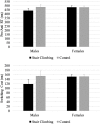Effects of a Brief Stair-Climbing Intervention on Cognitive Performance and Mood States in Healthy Young Adults
- PMID: 31681096
- PMCID: PMC6803754
- DOI: 10.3389/fpsyg.2019.02300
Effects of a Brief Stair-Climbing Intervention on Cognitive Performance and Mood States in Healthy Young Adults
Abstract
Objective: Previous studies focused on the benefits of acute exercise on cognition and mood have mostly used specialized laboratory-based equipment, thus little is known about how such protocols generalize to naturalistic settings. Stair climbing is a simple and readily accessible means of exercise that can be performed in naturalistic settings (e.g., at home or at the workplace). In the present study we examined the effects of stair-climbing intervals on subsequent cognitive performance and mood in healthy young adults.
Method: Thirty-two undergraduate students (M age = 19.4 years, SD = 1.3; 21 females) completed a controlled randomized crossover trial with session order counterbalanced across participants. Participants visited the lab on two occasions, one week apart, and completed one control session (no exercise) and one stair-climbing session (3 × 1 min stair-climbing intervals) with cognitive performance and mood assessed at the end of each session.
Results: Repeated measures ANCOVA revealed that males (Hedges' g av = 0.45) showed better switching performance following the stair climbing but females (Hedges' g av < 0.03) did not. Participants felt more energetic (Hedges' g av = 1.05), less tense (Hedges' g av = 0.61), and less tired (Hedges' g av = 0.43) following the stair climbing. In addition, higher exercise intensity during the stair climbing predicted better subsequent switching performance and higher energetic ratings.
Conclusion: These findings indicate that short bouts of stair climbing in a naturalistic setting can induce cognitive benefits for more challenging tasks, albeit only in males, indicating a sex-specific effect. Short bouts of stair climbing can be a practical approach to increase feelings of energy in daily life.
Keywords: acute exercise; executive function; mood states; physical activity; stair climbing.
Copyright © 2019 Stenling, Moylan, Fulton and Machado.
Figures
References
-
- ACSM, (2018). ACSM’s Guidelines for Exercise Testing and Prescription, 10th Edn Philadelphia, PA: Wolters Kluwer.
-
- Ando S. (2016). “Acute exercise and cognition: effects of cerebral oxygenation and blood flow,” in Exercise-Cognition Interactions: Neuroscience Perspectives, ed. McMorris T., (San Diego, CA: Academic Press; ), 131–146.
LinkOut - more resources
Full Text Sources
Miscellaneous



